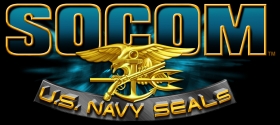
How SOCOM: US Navy SEALs Introduced Online Shooters To Consoles
Online multiplayer shooters are everywhere these days, and the available choice for modern gamers is frankly staggering. But there was a time when this was not the case for console gamers: in the days before the seventh generation of consoles (PlayStation 3, Xbox 360, and Nintendo Wii) encouraged online play by making it considerably more accessible. Some developers, however, were not so easily put off by the lack of user friendliness in these early days of online play and strived to set standards with brave new ideas. Although Nintendo may have pipped everyone to the post with their online RPG Fantasy Star Online in the year 2000, this only encouraged others to try and adapt different genres. One such developer was Zipper Interactive, with their third-person shooterSOCOM: U.S. Navy SEALs.
Although PC gamers had had access to multiplayer shooters for a few years by this point — including the likes of Counter-Strike and Team Fortress — console gamers' first foray into online shooters was SOCOM: U.S. Navy SEALs. Way back in the prehistoric year of 2002, players with a PlayStation 2 and a network adapter (as this was before the days of the PlayStation 2 "Slim" and its built-in network ports) could enjoy this multiplayer shooter in all its glory. It was also the first PlayStation game to utilise the headset online, which allowed players to communicate during their matches. Easy access to online gaming and communication between players is something we take for granted now, but Zipper's efforts 20 years ago were the baby-step beginnings of a new age for console gaming.

Though the game has a set of 12 offline single-player missions to complete, SOCOM: U.S. Navy SEALs is generally more fondly remembered for its (at the time, unique) online offering.
Online matches had you choose either the Navy SEALs or the terrorists, before choosing one of three game types: "Suppression", "Extraction", and "Demolition". Suppression was your typical team deathmatch, where the main goal was to eliminate all players on the opposing team. Extraction needed the SEAL team to rescue hostages before the defending terrorists were able to kill all the SEALs. Lastly, Demolition required your team to capture explosives and then use them to destroy the other team's base. Simplicity like this is a key, and often overlooked, aspect — why do you think later shooters like Call of Duty 4: Modern Warfare and Battlefield: Bad Company are so beloved? Their streamlined features helped them entice new players: they were easy to grasp and thus enjoyable.
These earlier online games required their servers to be supported by the developer, as this was long before the days when Sony offered any kind of dedicated service (SOCOM: U.S. Navy SEALs was published by Sony). It was exclusive to their console, and they took advantage to show what their new machine could do. Once the game and adaptor were purchased, the online offering was completely free; this also goes some way to explaining why people took the chance to try something new. If you already have the game, you may as well see all it has to offer.

It turns out that people liked what they saw and in a few short years many other developers would begin to create their own online multiplayer modes. This included games like Call Of Duty 3, Resident Evil: Outbreak, and Metal Gear Solid 3: Subsistence, even though the technology was still very much in its infancy.
The PlayStation 2 was also incredibly successful; it is the best-selling console to this day. Although a lot of that may have just been families wanting a DVD player, you can't help but think the large sales volumes helped vast numbers of gamers immerse themselves in every aspect of the new technology.
SOCOM: U.S. Navy SEALs was ultimately popular enough that the servers remained live for a decade after release. It survived nearly two full console generations, before being officially shut off not long before the PlayStation 4 and Xbox One consoles were released.

Now, it's evident that online multiplayer shooters would've eventually arrived on consoles, whether SOCOM: U.S. Navy SEALs existed or not, but we do owe this early attempt at utilising the technology and laying the groundwork its dues. Without Sony and Zipper trying to push the boundaries, who knows how long it would've taken for the countless modern shooters to have taken off and achieved what they have?







COMMENTS
David (nohfood4u) - 01:09am, 26th February 2023
21 years later. Still the most enjoyable game I ever played, imo. Peace.